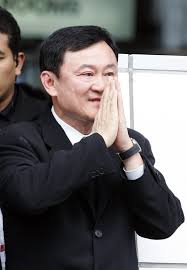วิกฤตเศรษฐกิจโลก : ทำไมจึงไม่ใช่เป็นเพียงแค่วิกฤตการเงิน แต่เป็นวิกฤตทางปัญญา
โดย ดร.ทักษิณ ชิณวัตร
ณ สมาคมผู้สื่อข่าวต่างประเทศ ฮ่องกง
12 มีนาคม 2552
ฟางเส้นสุดท้าย ที่ทำให้สถาบันการเงิน ล่มสลาย จนได้ลุกลามกลายเป็นวิกฤตเศรษฐกิจระดับโลกครั้งนี้ เกิดขึ้นจากนักการเงินใช้จ่ายเงินเกินตัวอย่างไร้เหตุผล การกำกับดูแลตรวจสอบสถาบันการเงินที่ไร้ประสิทธิภาพ และถ้าเราเชื่ออีกว่า การโยกย้ายผ่องถ่ายเงินไปทั่วโลกอย่างรวดเร็ว เป็นต้นเหตุสำคัญของวิกฤตที่กำลังเกิดขึ้นในปัจจุบัน ผมคิดว่าเรากำลังจะพลาดประเด็นที่สำคัญของปัญหาไปอย่างน่าเสียดาย
เราทราบกันดีว่าต้นเหตุของวิกฤตครั้งนี้ เกิดขึ้นชัดเจนตั้งแต่ปี 1997 โดยการโจมตีค่าเงินบาท และลุกลามกลายเป็น “ วิกฤตการเงินของเอเชีย ” ทุกประเทศในเอเชีย ยกเว้นเกาหลีเหนือได้ดำเนินนโยบายตาม “ฉันทามติแห่งวอชิงตัน ” ( Washington’s Mantra ) ซึ่งแต่ละประเทศประสบความสำเร็จมากบ้างน้อยบ้างแตกต่างกันไป แต่ดูเหมือนว่าประเทศที่เดินตาม“ฉันทามติแห่งวอชิงตัน” อย่างเคร่งครัด ในครั้งนั้น จะกลับกลายเป็นประเทศที่ได้ผลกระทบอย่างรุนแรงจากวิกฤตการ เงินรอบใหม่ในครั้งนี้
“ ฉันทามติแห่งวอชิงตัน ” ที่ทุกประเทศท่องจำจนขึ้นใจ คือ คำว่า “ ตลาดเสรี ” ( Free Markets ) ตลาดที่เป็นอิสระจากการกำกับควบคุมดูแล และจะนำไปสู่ความมั่งคั่งอย่างไม่มีขีดจำกัด สำหรับคนทุกหมู่เหล่า
ผมเติบโตมาในประเทศที่ได้รับประโยชน์มหาศาล จากการยอมรับนโยบายต่อต้านลัทธิคอมมิวนิสต์ยุคสงครามอินโดจีน ชนชั้นปกครองเชื่อว่า ประเทศจะประสบความสำเร็จและก้าวหน้าด้วยการเปิดประเทศ ทำตัวเป็นเจ้าบ้านที่ดี ต้อนรับใครก็ตามที่ต้องการทำธุรกิจกับเรา โดยเฉพาะ เมื่อมีข้อเสนอดี ๆ จาก 2 ประเทศมหาอำนาจ คือ สหรัฐอเมริกา และ ญี่ปุ่น ที่เวลานั้นเป็นหัวขบวนในการขับเคลื่อนเศรษฐกิจโลก
แนวความคิดจากต่างประเทศ ได้รับการยอมรับและนำไปปฏิบัติด้วยดี โดยไม่มีการตั้งคำถามว่า เราจะถูกกลืนเข้าไปในวังวนห่วงโซ่อุปสงค์และอุปทาน ของสินค้าและบริการหรือไม่ อย่างไร รวมทั้งระบบการเงินที่เราไม่สามารถตีตัวออกห่างได้ แม้ในยามที่เราประสบกับวิกฤตที่ร้ายแรงที่สุด เราไม่สามารถมีปากเสียงที่จะไปต่อกรว่า ความเชื่อมโยงต่าง ๆ เหล่านี้ ถูกบงการมาอย่างไร เราต้องปล่อยไปตามกระแส หรือไม่เช่นนั้น ก็ต้องถูกตราหน้าว่าเป็นพวกชาตินิยมและจะไม่สามารถแข่งขันกับใครได้ การพัฒนาทักษะจากจุดแข็งที่มีอยู่ของคนในประเทศ ถูกกล่าวหาว่าเป็นสิ่งเชื่องช้าล้าหลัง
การหมุนเวียนของเงิน และความหลากหลายของตราสารทางการเงินที่ถูกสร้างขึ้นจากศูนย์กลางการเงินต่าง ๆ ของโลกนั้น เพิ่มขึ้นเป็นทวีคูณวันต่อวัน ความรุ่งเรืองและความถดถอยเป็นวัฏจักรของธรรมชาติ แต่จะเป็นเรื่องที่น่าตกใจมาก ถ้าเกษตรกรและคนงานในโรงงานอุตสาหกรรมของเราต้องเดือดร้อน โดยได้รับผลกระทบจากวิกฤตเศรษฐกิจที่ไม่ได้เกิดขึ้นจากปัญหาภายในประเทศ แต่วิกฤตกลับเกิดเพราะรัฐบาลในขณะนั้นไม่มีความรู้ รู้ไม่เท่าทันการไหลเวียนของตราสารทางการเงินในตลาดต่างประเทศที่อยู่ห่างไกลจากอีกซีกโลกหนึ่ง
วิกฤตเศรษฐกิจในปี 1997 ทำให้เราต้องกลับมาเริ่มต้นคิดใหม่ว่า เราจะสามารถก่อร่างสร้างตัวได้อย่างไร ในแนวทางที่มีเหตุมีผล ซึ่งจะทำให้เราสามารถควบคุมเศรษฐกิจ ให้ดำเนินไปในแบบอย่างที่เราอยากจะให้เป็นได้มากขึ้น ผลของการคิดอย่างต่อเนื่องและเป็นระบบ ถูกร่างเป็นนโยบายของพรรคการเมือง ที่ผมก่อตั้งขึ้น ด้วยแนวความคิดหลัก ที่ต้องการให้คนไทยทั่วทั้งประเทศทุกพื้นที่ นำจุดเด่น จุดได้เปรียบ ของตนเองมาผลิตสินค้าและบริการออกไปขาย และแข่งขันอย่างมีประสิทธิภาพได้ในตลาดโลก ทั้งยังเสนอวิธีการช่วยเหลือและพัฒนาความได้เปรียบเหล่านั้นให้มีประสิทธิภาพอย่างเป็นรูปธรรม
แนวความคิดนี้ ไม่เชื่อเรื่องการปิดประเทศ การปิดประเทศอาจเป็นไปได้ เพราะประเทศไทย เป็นประเทศที่อุดมสมบูรณ์ แต่เราเลือกที่จะไม่ถอนตัวจากเศรษฐกิจโลก แต่จะทำให้ประเทศไทยดีขึ้น และเป็นประเทศที่น่าอยู่สำหรับทุกคน ผมมีความยินดีที่จะรายงานว่า หลายนโยบายที่ผมได้พัฒนาไว้ รัฐบาลต่อ ๆ มาของไทยเห็นด้วยและนำมาใช้บริหารประเทศอย่างต่อเนื่อง แม้บางครั้งจะถูกเปลี่ยนชื่อไปเป็นอย่างอื่น แต่สาระสำคัญของนโยบายยังคงอยู่เหมือนเดิม
ครั้งนี้ไม่ใช่เป็นเพียงวิกฤตการเงิน แต่เป็นวิกฤตทางปัญญาของโลก นาย โทนี่ แบลร์ อดีตนายกรัฐมนตรีอังกฤษ ให้ความเห็นว่า ถ้าคุณไปถาม ผู้เชี่ยวชาญว่า จะแก้ปัญหาวิกฤติเศรษฐกิจโลกครั้งนี้อย่างไร คำตอบที่คุณจะได้รับ น่าจะเป็นคำตอบว่า “ ผมจนปัญญาจริง ๆ ครับ ”
วิกฤติครั้งนี้เป็นวิกฤตทางปัญญาของโลก ( Intellectual Crisis ) ซึ่งเป็นผลจากการปฏิเสธที่จะเผชิญหน้ากับความเป็นจริง และที่สำคัญที่สุดปฏิเสธที่จะคิดแก้ปัญหาจากภาคเศรษฐกิจที่แท้จริง ( Real Economy )
วันนี้ไม่มีใครสามารถหมุนเวลาย้อนกลับ และถอนตัวจากเศรษฐกิจยุคโลกาภิวัตน์ ได้ สิ่งที่เศรษฐกิจยุคโลกาภิวัตน์ต้องการ คือ การถูกกำกับดูแลระดับโลก ( Globalized Regulation ) ซึ่งยังไม่มีประเทศใดกล้าที่จะพูดถึง เพราะการทำเช่นนั้น หมายถึงการท้าทายความเป็นผู้นำเศรษฐกิจโลกของสหรัฐอเมริกา คู่ค้าที่สำคัญอย่างประเทศจีน มีประสบการณ์มากมายในอดีต น่าจะมีบทบาทสำคัญที่จะช่วยแก้ไขปัญหาในขณะนี้ได้ แต่ก็ยังไม่กล้าทำเช่นนั้น เพราะด้วยเหตุผลทางการเมืองที่ไม่ต้องการแสดงให้เห็นว่า จีนอยากแข่งขัน และเป็นผู้นำของโลกแทนสหรัฐอเมริกา จีนต้องการคงบทบาทเป็นแค่เพียงผู้สนับสนุนที่ดีเท่านั้น
ขณะที่สหรัฐอเมริกาและยุโรป กำลังหาทางแก้ปัญหาวิกฤตทางปัญญาอยู่ หรือกล่าวอีกนัยหนึ่งก็คือ กำลังหาทางที่จะผลิตสินค้าและบริการอะไรสักอย่างที่ดีกว่า การสร้างตราสารทางการเงิน และเป็นความต้องการของตลาดโลกชิ้นใหม่ที่สำคัญ ต้องเป็นผลิตภัณฑ์ที่จีนและอินเดียไม่สามารถผลิตได้ด้วยต้นทุนที่ต่ำกว่า
อะไรคือหนทางรอดของประเทศเล็ก ๆ ที่เหลืออยู่ในภูมิภาคเอเชีย ?
เราต้องสร้างความสามารถในการแข่งขันอย่างมีประสิทธิภาพให้ได้ ด้วยทรัพยากรที่เรามีอยู่ ซึ่งไม่ด้อยไปกว่าใครทั้งในเชิงคุณภาพและปริมาณ คนของเราได้รับการศึกษาที่ดีกว่าในอดีตมาก ประกอบกับคนงานของเราไม่ได้มีความมั่นคงในหน้าที่การงาน เหมือนกับที่ชาวอเมริกันในอุตสาหกรรมรถยนต์และเหล็กได้รับมายาวนาน ดังนั้นเราจึงสามารถฝึกอบรมคนงานของเราใหม่ได้ไม่ยาก โดยไม่ต้องกลัวกับการต้องจ่ายเงินชดเชยให้กับผู้จัดการทั้งหลาย ที่หมดไฟในการทำงานและขาดแคลนความคิดสร้างสรรค์ใหม่ ๆ
อุตสาหกรรมการเกษตรของเรา ก็ก้าวมาถึงขั้นที่สามารถปรับปรุงคุณภาพและความหลากหลายเพื่อตอบสนองความต้องการของตลาดต่าง ๆ ที่มีอยู่มากมาย ทั่วโลก อุตสาหกรรมระดับหมู่บ้านก็สามารถปรับให้อยู่ในรูปของอุตสาหกรรมขนาด กลางและขนาดเล็กคล้ายกับของประเทศอิตาลีที่สามารถเอาตัวรอดได้ในยาม วิกฤตมานับครั้งไม่ถ้วน ระบบเศรษฐกิจบนพื้นฐานความคิดสร้างสรรค์ ( Creative Economy ) ไม่จำเป็นที่จะต้องถูกผูกขาดเฉพาะชาวยุโรปเท่านั้น ระบบเศรษฐกิจบนพื้นฐานความคิดสร้างสรรค์ และจะต้องถูกพัฒนาอย่างจริงจัง จะเป็นทางออกที่สำคัญของประเทศในอนาคต จะเป็นตัวจักรสำคัญในการสร้างมูลค่าเพิ่มให้กับสินค้าและบริการ จะทำให้เกิดการสร้างงานที่มั่นคงและสังคมที่แข็งแรงในอนาคต
ทั้งหมดที่ผมได้กล่าวมานี้ จำเป็นจะต้องได้รับความช่วยเหลือด้านการพัฒนาอย่างมีเป้าหมายซึ่งสามารถทำได้ ทุนสำรองระหว่างประเทศไม่ใช่สิ่งที่ไม่สำคัญแต่คงไม่มีประเทศใดใช้ทุนสำรองระหว่างประเทศที่มีอยู่ทั้งหมดไปกับการแก้ไขปัญหาของประเทศ เพราะกลัวว่าประเทศจะประสบกับภาวะวิกฤตทางการเงิน ด้วยเหตุนี้เองที่แนวทางในการพัฒนาตลาด “ พันธบัตรเอเชีย ” ( Asia Bonds ) ที่ผมเป็นผู้ริเริ่มจึงมีบทบาทสำคัญ หากจีนและญี่ปุ่นยอมรับที่จะเป็นผู้นำในการนี้ ประกอบกับความร่วมมือของประเทศอื่น ๆ ที่มีทุนสำรองส่วนเกิน เราจะมีแหล่งเงินทุนสำหรับใช้พัฒนาเศรษฐกิจของเราในอนาคตได้อย่างมั่นใจ
ทั้งนี้ ไม่ได้หมายความว่าประเทศในเอเชียและประเทศกำลังพัฒนาอื่น ๆ ในโลกจะอยู่ได้อย่างมั่นคง โดยไม่คำนึงถึงประเด็นเกี่ยวกับธรรมาภิบาล ซึ่งขณะเดียวกันเรายังต้องรักษาและยึดมั่นในระบอบประชาธิปไตย ดังการศึกษาของ “ อมาตยา เซน ” ( Amartya Sen ) ที่แสดงให้เห็นว่า “ ระบอบประชาธิปไตย เป็นหนทางเดียวที่จะช่วยป้องกันปัญหาความอดอยาก ” มีแต่การพัฒนาที่สมดุลที่คนจนและคนด้อยโอกาสไม่ถูกละเลยเท่านั้น ที่จะนำมาซึ่งเสถียรภาพในระยะยาว
เราจำเป็นต้องเรียนรู้ความสำเร็จ ของพรรคคอมมิวนิสต์จีน ได้ใช้นโยบายยืดหยุ่นและละเอียดอ่อน ในการปกครองประชาชนและการบริหารประเทศ จนประสบความสำเร็จอย่างน่าตื่นตาตื่นใจ ทำให้จีนกลายเป็นโรงงานของโลก ผลิตสินค้า ทำรายได้ และที่สำคัญมีเงินออมมากมายเพียงพอ ที่จะอุดหนุนการใช้จ่ายการบริโภคของประชาชนในประเทศมหาอำนาจที่ยิ่งใหญ่ที่สุดในโลกได้
จากวิกฤตครั้งนี้ ถึงเวลาแล้วที่จีนจะต้องใช้เงินออมที่มีอยู่ เป็นแหล่งทุน สำหรับการสร้างโอกาส สร้างความมั่งคั่ง ให้กับประชาชนของตน ด้วยการพัฒนาโครงสร้างพื้นฐานทางเศรษฐกิจและสังคม ปรับปรุงคุณภาพชีวิตของประชาชนให้ทั่วทั้งประเทศทัดเทียมและดียิ่งขึ้นมากกว่าที่เป็นอยู่ในปัจจุบัน เพราะการทำเช่นนี้นอกจากจะช่วยลดแรงกดดันทางสังคมและการเมืองที่มีต่อพรรคคอมมิวนิสต์แล้ว ยังช่วยลดแรงกดดันจากสหรัฐอเมริกาได้อีกด้วย
เราต่างรู้ดีว่าปัญหาวิกฤตเศรษฐกิจครั้งนี้...ร้ายแรงกว่าที่หลายคนคิดไว้มาก จนในที่สุดรัฐบาลอาจหนีไม่พ้น จำเป็นต้องเข้าไปช่วยเหลือวิสาหกิจขนาดใหญ่ที่กำลังล่มสลาย แต่รัฐบาลของเราต้องให้ความช่วยเหลืออย่างมีความซื่อสัตย์ทางปัญญา กล้าปฏิเสธความไม่ถูกต้อง หากจำเป็นต้องเข้าไปรับผิดชอบความเสียหายของธุรกิจใด ๆ ก็ตาม ต้องทำอย่างเสมอภาคและเท่าเทียม รัฐบาลต้องกล้าที่จะประกาศว่า เงินภาษีของประชาชนที่รัฐบาลจะนำไปให้ความช่วยเหลือนั้นจะต้องไม่ถูกนำไปจ่ายเป็นค่าโบนัสให้กับบรรดาผู้บริหารทั้งหลายที่สร้างความเสียหายให้กับธุรกิจนั้น
ปัญหาวิกฤตเศรษฐกิจโลกจะไม่มีทางแก้ไขได้ ถ้านักเศรษฐศาสตร์ยังคิดว่าการขับเคลื่อนเศรษฐกิจให้เดินไปข้างหน้า ต้องพึ่งพาพลังเศรษฐกิจขนาดใหญ่เท่านั้น ถึงวันนี้เราต้องยอมรับความจริงว่า ความสามารถในการชำระหนี้ต่างหากคือกุญแจสำคัญไม่ใช่เรื่องของขนาดเท่านั้น “ ขนาด ” จะมีบทบาทช่วยได้ ตราบเท่าที่ “ ขนาด ” และความสามารถในการชำระหนี้เดินหน้าไปพร้อมๆ กัน
ธุรกิจจะเติบโตได้ตราบเท่าที่มีความสามารถในการชำระหนี้ ความสามารถในการชำระหนี้ย่อมเกิดจากความสามารถในการสร้างรายได้สุทธิ ( Net Income ) เงินออมจะมีประสิทธิภาพได้ ก็ต่อเมื่อเงินออมนั้นมาจากรายได้สุทธิเช่นกัน
สมมติว่าเราสามารถคลี่คลายวิกฤตสถาบันการเงินของโลกได้แล้ว ธนาคารกลับมาเข้มแข็งอีกครั้ง เพราะได้รับการชดเชยและสนับสนุนจากรัฐบาล ธนาคารเหล่านั้นจะทำธุรกิจอะไร พวกเขาจะให้ใครกู้เงิน และจะให้เงินกู้เพื่อทำธุรกิจแบบเดิม ๆอีก...อย่างนั้นหรือ
วันนี้ ท่าเรือสำคัญของโลกเต็มไปด้วยตู้คอนเทนเนอร์ ที่อัดแน่นด้วยสินค้าที่ผลิตแบบเดียวกัน เหมือนกัน จำนวนมากมายมหาศาล เราจะผลิตสินค้าแบบนั้นเพิ่ม ขึ้น.....อีกหรือ คนงานจีนจะยังเดินหน้าผลิตรถยนต์เหมือนกับที่คนงานอเมริกันคงผลิตและขายไม่ออก....อีกหรือ
เราต้องยอมรับว่าสินค้ากำลังล้นตลาด การผลิตสินค้าแบบอุตสาหกรรม ( Mass Production ) มีขีดจำกัด เราจึงจำเป็นต้องสนับสนุนการสร้างรายได้แบบใหม่ด้วยการผลิตสินค้าและบริการที่อาศัยความได้เปรียบจากสินทรัพย์วัฒนธรรม ภูมิปัญญาแห่งชนชาติ และการผลิตด้วยทักษะแรงงาน ที่เต็มไปด้วยความคิดสร้างสรรค์ อย่างมีเอกลักษณ์เฉพาะตัว พร้อมทั้งสนับสนุนการสร้างตลาดที่จะแลกเปลี่ยนสินค้าระหว่างท้องถิ่นที่คึกคักและมีชีวิตชีวา
วันนี้...จึงเป็นหน้าที่ที่เราจะต้องพยายามค้นหาสินค้าและบริการเหล่านั้นให้พบ รวมทั้งให้การสนับสนุนด้านเงินทุนในทุกวิถีทาง เพื่อทำให้ธุรกิจเหล่านี้อยู่รอด เราจึงจะสามารถสร้างระบบเศรษฐกิจที่มั่นคงและสังคมที่แข็งแรงได้ในระยะยาว
ผมเชื่อว่า อเมริกา มีพลังของภูมิปัญญาในหลากหลายแขนง ซึ่งสามารถสร้างสรรค์สินค้าและบริการอย่างมีคุณภาพสูง โดยไม่จำเป็นต้องแข่งขันด้านราคากับใคร โลกกำลังต้องการพลังงานทดแทนที่มีประสิทธิภาพและต้นทุนต่ำอย่างพลังงานนแสงอาทิตย์ โลกกำลังต้องการเทคโนโลยีและบริการที่ให้ความสำคัญกับการปกป้องสิ่งแวดล้อม
อเมริกามีผู้เชี่ยวชาญที่มีความรู้และสามารถสร้างนวัตกรรม เพื่อตอบสนองความต้องการของโลกยุคใหม่นี้อย่างไม่ยากเย็น เมื่อสหรัฐอเมริกา เริ่มที่จะใช้เทคโนโลยีและผลิตภัณฑ์ใหม่ๆเหล่านี้ ก็จะเป็นการบังคับให้ประเทศต่างๆ ในเอเชียรวมทั้งประเทศอื่น ๆ ในโลก ต้องปรับปรุงกระบวนการผลิตสินค้าและบริการ
สติปัญญาของชาวอเมริกัน สามารถสร้างสิ่งเหล่านี้ ให้เกิดขึ้นมาได้ ซึ่งจะเป็นผลดีต่อชาวอเมริกันเอง รวมทั้งต่อประเทศอื่นๆ ในโลก เพียงแต่ชาวอเมริกันต้องยอมรับว่า “ โลกในอนาคตจะต้องไม่ถูกกำหนดจากวอลสตรีท ที่สำคัญสินค้าและบริการต้องมีความสัมพันธ์กับการจ้างงาน รวมทั้งให้ความสำคัญกับสิ่งแวดล้อม และนำมาซึ่งรายได้สุทธิ ( Net Income) ที่คุ้มค่ากับความตั้งใจที่ใส่ลงไป ”
การสร้างเศรษฐกิจที่แท้จริง ( Real Economy ) มีความสำคัญอย่างยิ่ง การค้าตราสารทางการเงิน ( Paper Trading ) จะเป็นประโยชน์ก็ต่อเมื่ออยู่ภายใต้การกำกับดูแลที่เหมาะสมเท่านั้น
หากบรรดาผู้นำทางปัญญาในสหรัฐอเมริกา ยอมรับแนวคิดนี้ได้เร็วเท่าใด ผลดีที่จะเกิดขึ้นต่อเราทุกคนในโลกก็จะมีมากขึ้น...เท่านั้น
=================================================
World economic crisis: Why is it an intellectual crisis and not just a financial mess?
The straw that broke the camel's back was certainly the "irrational exuberance" of the financial wizards and the Rip Van Winkle-like slumber of their supposed regulators. But we will be missing the terrible point if we believe, as many obviously do, that the clever agility of the money movers was the only or major cause of the current crisis.
For a few of us involved in policymaking, the root causes became obvious in 1997. The revelation was not the result of some esoteric academic research. We were jolted and shocked by the onslaught of what was conveniently called the Asian financial crisis. There was nothing peculiarly Asian about it. All Asian countries, save North Korea, had been following "the Washington consensus" with varying degrees of success. The more successful ones got hit.
Washington's mantra was and, I am afraid, is "free markets. Period." Markets freed from any kind of regulation would by themselves bring about boundless prosperity to all and sundry.
I grew up in a country that benefitted substantially from agreeing to be anticommunist during the Indochina war. The elite among my compatriots continued to believe that all will be well if we could just be charming hosts to whoever wanted to do business with us. Any proposal from America or Japan must be good because, after all, they were the engines of growth for the whole world. All ideas from abroad were unquestioningly accepted and implemented. It did not matter
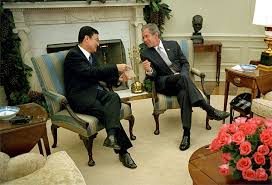 that we were being sucked into global demand and supply chains for goods, services and money from which we will not be able to extricate ourselves even in the worst of times. We had no say in how these chains were being manipulated. We had to float along with the flow or be branded nationalist and uncompetitive. To nurture our own inherent strengths was considered unfashionable.
that we were being sucked into global demand and supply chains for goods, services and money from which we will not be able to extricate ourselves even in the worst of times. We had no say in how these chains were being manipulated. We had to float along with the flow or be branded nationalist and uncompetitive. To nurture our own inherent strengths was considered unfashionable.
The velocity of circulation of money and assorted paper generated from financial centres multiplied day by day. Booms and bursts were the natural order of things. If you, especially the farmers and industrial workers, were burst for no good domestic economic reason, it was because you were not nimble enough to sense the flow of paper between distant markets.
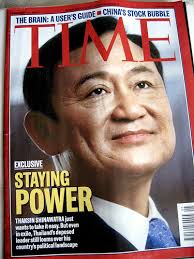 The 1997 crisis made us think: How can we rebuild our lives in ways that made sense to us and in ways over which we can gradually aspire to have some degree of control? The result of that sustained thinking was the first manifesto of the political party that I founded. It identified areas where we Thais could have a comparative advantage in producing for and servicing the world and proposed to apply development assistance to those areas. The idea was not to close the borders and be self-sufficient, though we could accomplish that without great pain as we are blessed with a fertile soil. But our choice was not to withdraw from the world but to make it a better and more stable place for all. I am glad to report that my successor in government is by and large sticking to our original plan though, for obvious reasons, he has chosen to call it by different names.
The 1997 crisis made us think: How can we rebuild our lives in ways that made sense to us and in ways over which we can gradually aspire to have some degree of control? The result of that sustained thinking was the first manifesto of the political party that I founded. It identified areas where we Thais could have a comparative advantage in producing for and servicing the world and proposed to apply development assistance to those areas. The idea was not to close the borders and be self-sufficient, though we could accomplish that without great pain as we are blessed with a fertile soil. But our choice was not to withdraw from the world but to make it a better and more stable place for all. I am glad to report that my successor in government is by and large sticking to our original plan though, for obvious reasons, he has chosen to call it by different names.
The intellectual crisis facing the world now was summarized by Tony Blair, the former British Prime Minister, the other day: "Ask the experts what to do, and the most honest reply is 'I don't know'."
This state of affairs, and state of mind, are the results of a refusal to face reality and to think in temis of the real economy.
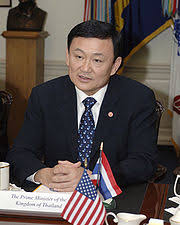 American and Japanese prosperity was built on lessons those nations learnt from the industrial revolution in Europe, and the cultivation of their ability to mass produce what the world needed, with incremental improvements in quality and variety as they went along. The innovations in quality and variety were possible because the best minds in America and Japan were then engaged in that task. But no longer. The brightest from American, European and Japanese universities in the past three decades went into financial services, some of them just servicing just each other. Their creativity was confined to designing paper that promised returns at an ever-rising angle of 45 degrees. If anyone questioned the sustainability of such schemes, he was shot down by accusations of being restrictive, anti-globalization and anti-progress.
American and Japanese prosperity was built on lessons those nations learnt from the industrial revolution in Europe, and the cultivation of their ability to mass produce what the world needed, with incremental improvements in quality and variety as they went along. The innovations in quality and variety were possible because the best minds in America and Japan were then engaged in that task. But no longer. The brightest from American, European and Japanese universities in the past three decades went into financial services, some of them just servicing just each other. Their creativity was confined to designing paper that promised returns at an ever-rising angle of 45 degrees. If anyone questioned the sustainability of such schemes, he was shot down by accusations of being restrictive, anti-globalization and anti-progress.
 No one can set the clock back and withdraw from the globalized economy now. But what the globalized economy needs is globalized regulation which no one dares to talk about as that could be taken to mean challenging the American leadership of the world economy. The Chinese certainly have the historical experience and now the economic wherewithal to propose ways to break the mould. But they will not – for the practical political purpose of not wanting to be seen to be competing with America for leadership. They only wish to complement.
No one can set the clock back and withdraw from the globalized economy now. But what the globalized economy needs is globalized regulation which no one dares to talk about as that could be taken to mean challenging the American leadership of the world economy. The Chinese certainly have the historical experience and now the economic wherewithal to propose ways to break the mould. But they will not – for the practical political purpose of not wanting to be seen to be competing with America for leadership. They only wish to complement.
While the US and Europe are working through their intellectual crisis – finding ways to do something more than create paper, develop new products and services which the world needs and which the Chinese and Indians cannot produce at lower cost – we in the rest of Asia, and the world, still have to survive.
 We have to do what we can with resources that we have. Our resources are not meagre. Our peoples are much better educated now than ever before. Our workers have not had the comfort of enjoying long-term job security doing the same thing day in and day out, like the American auto or steel workers. We can retrain them easily without subsidizing managers who have run out ideas. Our agribusinesses have reached a stage where they can improve their quality and variety on their own steam to cater efficiently to different pallets in numerous markets. The village industries can be turned into small- and medium-scale enterprises like those of Italy that have survived countless crises. Creative economies need not be the monopoly of Europeans. Employment creation can be a function of wealth creation.
We have to do what we can with resources that we have. Our resources are not meagre. Our peoples are much better educated now than ever before. Our workers have not had the comfort of enjoying long-term job security doing the same thing day in and day out, like the American auto or steel workers. We can retrain them easily without subsidizing managers who have run out ideas. Our agribusinesses have reached a stage where they can improve their quality and variety on their own steam to cater efficiently to different pallets in numerous markets. The village industries can be turned into small- and medium-scale enterprises like those of Italy that have survived countless crises. Creative economies need not be the monopoly of Europeans. Employment creation can be a function of wealth creation.
All this, of course, needs targeted development assistance, which we can provide. Our reserves are not insignificant. But no country will dare to use all of it for national development for fear of run on its currency. This is where structured Asian Bonds that I have been advocating come into play. If China and Japan were to take the lead, in partnership with some other countries with surpluses, we can finance our future development with confidence.
This does not mean that Asia and the rest of the developing world are without governance issues. We will have to reaffirm our faith in democracy. For, as Amartya Sen's research showed, only democracy can help us on a long-term basis to prevent starvation. Only a balanced development where the poor and the less able are not ignored can guarantee long-term stability.
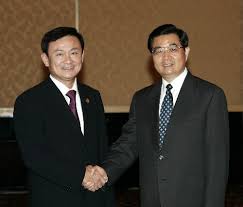 It was wonderful to learn that a communist party in Asia was able, with Chinese sensibility as the major invisible element, to produce and save enough to subsidize the world's greatest power consumption. Now, it is time for China to expand wealth creation opportunities by using its national savings to fund opportunities for the rest of the masses. Reducing its savings but building structures to facilitate qualitative changes in the living standards of the rest of the country is not a bad idea. By so doing China will reduce social and political pressures on the party and also reduce trade pressures from the US.
It was wonderful to learn that a communist party in Asia was able, with Chinese sensibility as the major invisible element, to produce and save enough to subsidize the world's greatest power consumption. Now, it is time for China to expand wealth creation opportunities by using its national savings to fund opportunities for the rest of the masses. Reducing its savings but building structures to facilitate qualitative changes in the living standards of the rest of the country is not a bad idea. By so doing China will reduce social and political pressures on the party and also reduce trade pressures from the US.
 The current downturn is so severe that we may not be able to completely avoid rescuing certain vital enterprises. We will be intellectually honest and not hesitate to use the n word. When our governments take a stake in an enterprise, they should not flinch from stipulating that the new money cannot be used to pay bonuses to managers who have made losses for their companies.
The current downturn is so severe that we may not be able to completely avoid rescuing certain vital enterprises. We will be intellectually honest and not hesitate to use the n word. When our governments take a stake in an enterprise, they should not flinch from stipulating that the new money cannot be used to pay bonuses to managers who have made losses for their companies.
Intellectual honesty has to be applied across the board.
The world economy will never settle down so long as the majority of economists think the size of the economy is the foremost factor in determining viability of the economy. At this point of global reality, the ability to pay for one's debt is the key. Not the size. Size will help as long as the size is in synch with the ability to repay debt.
 Assuming that the world banking crisis is resolved, what will the new strong or subsidized banks do? What will they finance? Finance mass production of sameness? World's harbours are full of containers loaded with mass-produced goods. Produce more of the same? Will the Chinese workers now go on producing the steel and cars that the Americans cannot sell? The world's intellectuals have to accept that there are limits to growth of mass production. Certain production has to be internalized – to take advantage of the creativity of the country or region or city. To take advantage of local skills and availability of other local products. Only such skill-oriented, innovation-prone production can be sustained over a long period of time. The trick is in identifying such products and services and financing them in a viable way.
Assuming that the world banking crisis is resolved, what will the new strong or subsidized banks do? What will they finance? Finance mass production of sameness? World's harbours are full of containers loaded with mass-produced goods. Produce more of the same? Will the Chinese workers now go on producing the steel and cars that the Americans cannot sell? The world's intellectuals have to accept that there are limits to growth of mass production. Certain production has to be internalized – to take advantage of the creativity of the country or region or city. To take advantage of local skills and availability of other local products. Only such skill-oriented, innovation-prone production can be sustained over a long period of time. The trick is in identifying such products and services and financing them in a viable way.
 America does have the diverse range of intellectual power needed to create products and services whose perceived value will break the price barriers. Its technological ability is so varied and high-end that, if applied in a concerted way, it can break the barriers. The world needs efficient and inexpensive solar cells which only American technology might be able to produce. The world needs new technologies and services to protect the environment which only American scientists might be capable of delivering.
America does have the diverse range of intellectual power needed to create products and services whose perceived value will break the price barriers. Its technological ability is so varied and high-end that, if applied in a concerted way, it can break the barriers. The world needs efficient and inexpensive solar cells which only American technology might be able to produce. The world needs new technologies and services to protect the environment which only American scientists might be capable of delivering.
When America starts delivering these new technologies and products, it is going to force Asia and the rest of the world to upgrade their production processes and services. This will be the virtuous circle that American intellect can create. They just have to accept that the world's future need not be determined in Wall Street and that products and services that are linked to employment and the environment and which generate a net income are worthy of their attention.
Real economy does matter. Paper trading is useful only when regulated.
Sooner the greatest minds in the US accept this the better it will be for all of us.
Dr Thaksin Shinawatra is Chairman of the. Building a Better World Foundation and was the longest-serving democratically-elected Prime Minister of Thailand



